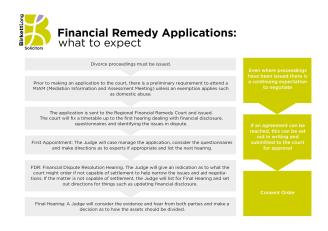Blog
Financial Remedy Applications: What to expect
- Posted:
- 8 March 2021
- Time to read:
- 4 mins
Whilst I would consider that an application to the court should be an option of last resort, sometimes it is absolutely necessary. This might be because:
- there is a benefit to there being a firm timetable, or
- because there are difficulties with disclosure or valuations, or
- because you are currently too far apart in the negotiations.
If you find yourself considering or being advised to issue an application, what should you expect?
The diagram below illustrates what you might expect in standard proceedings.

You will see that divorce proceedings must be issued. This is because the court’s power to make the majority of financial remedy orders is only triggered when divorce proceedings have been issued.
Currently divorce proceedings can be issued on the grounds of adultery, unreasonable behaviour, 2 years separation and consent, desertion or 5 years separation.
Prior to making an application to the court for a financial remedy order, there is a preliminary requirement to attend a MIAM (Mediation Information and Assessment Meeting) unless an exemption applies such as domestic abuse. The purpose of this is to allow you to explore with a mediator the possibility of reaching an agreement outside of the court process. The mediator is required to sign part of the application form to confirm that this meeting has happened.
The Application is sent to the Regional Financial Remedy Court and issued. The Regional Financial Remedy Court for Essex, Suffolk, Norfolk, Cambridgeshire, Hertfordshire and Bedfordshire is in Peterborough. The court fee is currently £255 but can be reduced or waived where the applicant has a low income or is in receipt of benefits.
When issuing the application, the court will fix a timetable up to the first hearing dealing with financial disclosure, questionnaires and identifying the issues in dispute. Both parties are obliged to give full and frank financial disclosure of their financial positions. This is done in a standard form called a Form E. This form is accompanied by various documents to evidence and support the information in the form.
First Appointment: The Judge will case manage the application, consider the questionnaires and make directions as to experts if appropriate and list the next hearing. There is an expectation that the parties consider the need for expert evidence prior to that first hearing.
If it is considered that expert evidence dealing with property or business valuation for example is necessary, there are rules which must be followed so that the court can consider whether permission for that evidence should be provided. Where permission is given for expert evidence it will usually be for a single joint expert.
Financial Dispute Resolution Hearing (FDR): The Judge will give an indication as to what the court might order if not capable of settlement to help narrow the issues and aid negotiations. If the matter is not capable of settlement, the Judge will list for Final Hearing and set out directions for things such as updating financial disclosure. Sometimes, and particularly in a very straight forward and well managed case, the court can be asked to conduct this exercise at the first hearing.
Final hearing: In the event that parties remain unable to agree a settlement the court will conduct a Final Hearing. A final hearing will require a Judge to consider the evidence and hear from both parties and make a decision as to how the assets should be divided. In making that decision, the judge must weigh all the circumstances of the case and in particular, the needs of any children of the family. The other factors which the judge must consider are the parties
- needs,
- resources,
- standard of living,
- incomes and earning capacity,
- the length of the marriage, and
- conduct and contributions.
Once the order is made, and decree absolute has been granted, the order should usually be considered as final, binding and capable of enforcement although it is important to appreciate that some types of order such as maintenance are capable of variation.
Whilst the court process will certainly result in a final order and a resolution of the financial issues, it is important not to rely solely on resolution by these means. Court proceedings are very costly and as a general rule of thumb, you could expect your legal costs to double at each hearing stage.
Court proceedings are also frustratingly slow. This has been particularly slow as a result of the COVID-19 pandemic as the court had to prioritise other types of cases. With this in mind, there is an expectation that even where proceedings have been issued, parties should continue to try to negotiate an outcome. Where this is possible, a consent order can then be submitted to the court for approval.
Hopefully, you will now have a broad idea of what to expect when proceedings are issued. Please note however, that every case is different and some cases involve issues that require additional applications to be made, additional hearings and bespoke directions from the court. This note is no replacement for independent legal advice tailored to your specific circumstances.
Should you find yourself in a situation where financial matters need to be resolved as a result of divorce or separation then contact our expert divorce lawyers. We offer a free, no obligation, 15 minute call to discuss your circumstances and consider how we can help. I can be contacted on 01206 217305 or karen.johnson@birkettlong.co.uk.










